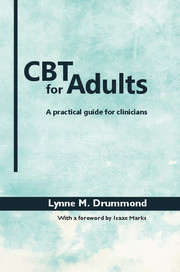Book contents
- Frontmatter
- Dedication
- Contents
- List of tables, boxes, figures and case examples
- Foreword
- Preface
- Structure of the book
- List of abbreviations
- 1 Introduction
- 2 Assessment
- 3 Rules of reinforcement and practical examples
- 4 Social skills training
- 5 Relationship, communication and sexual skills training
- 6 Phobic and social anxiety
- 7 Treatment of obsessive–compulsive disorders
- 8 Depression
- 9 Generalised anxiety disorder and panic
- 10 Body dysmorphic disorder and the somatic symptom and related disorders
- 11 Eating disorders
- 12 Addictive behaviour
- 13 Schizophrenia and the psychoses
- 14 Personality disorder
- 15 CBT in combination with other therapy
- Glossary
- Index
- Frontmatter
- Dedication
- Contents
- List of tables, boxes, figures and case examples
- Foreword
- Preface
- Structure of the book
- List of abbreviations
- 1 Introduction
- 2 Assessment
- 3 Rules of reinforcement and practical examples
- 4 Social skills training
- 5 Relationship, communication and sexual skills training
- 6 Phobic and social anxiety
- 7 Treatment of obsessive–compulsive disorders
- 8 Depression
- 9 Generalised anxiety disorder and panic
- 10 Body dysmorphic disorder and the somatic symptom and related disorders
- 11 Eating disorders
- 12 Addictive behaviour
- 13 Schizophrenia and the psychoses
- 14 Personality disorder
- 15 CBT in combination with other therapy
- Glossary
- Index
Summary
Overview
This chapter gives a full description of assessment of the patient for CBT and the development of the cognitive–behavioural formulation. The assessment starts with a full description of a thorough psychiatric history and looks at various aides-memoires and models of symptom development before demonstrating how a full cognitive–behavioural formulation can be derived. There is full description of the measurement of problems, the identification of goals and the roles of behavioural tests and questionnaire assessment.
Many people assume that there is a great mystery to the art of performing a good cognitive–behavioural assessment. In fact, this is far from the truth and any thorough clinician should elicit sufficient information to enable an adequate formulation to be made, and to implement a treatment regime. Following this procedure, measures of the problem are used to gauge the severity and to enable both the therapist and the patient to monitor progress, success or failure of the treatment.
To obtain a CBT assessment does, of course, require that the therapist is a skilled interviewer who is familiar with putting people at ease and dealing with patients. As the skills of psychiatric and general psychological interviewing are beyond the scope of this book, any reader who is unsure about this should not attempt CBT assessment until they have undergone a refresher course.
The chapter is divided into four main sections. The first concentrates on CBT history-taking and assessment, the second on the CBT formulation, the third on the education of the patient and planning treatment, and finally, the fourth section discusses the use of baseline and successive measures of the problem. As CBT psychotherapists come from a whole range of mental healthcare professions, it is important that these assessment procedures are used as an adjunct to rather than a replacement for general assessment procedures. All therapists should have a protocol in their mind for obtaining general information and assessing psychiatric patients. Just because a patient arrives at a clinic referred for CBT does not exclude the possibility of other major mental health problems, or even serious physical disorder.
- Type
- Chapter
- Information
- CBT for AdultsA Practical Guide for Clinicians, pp. 8 - 29Publisher: Royal College of PsychiatristsPrint publication year: 2014



